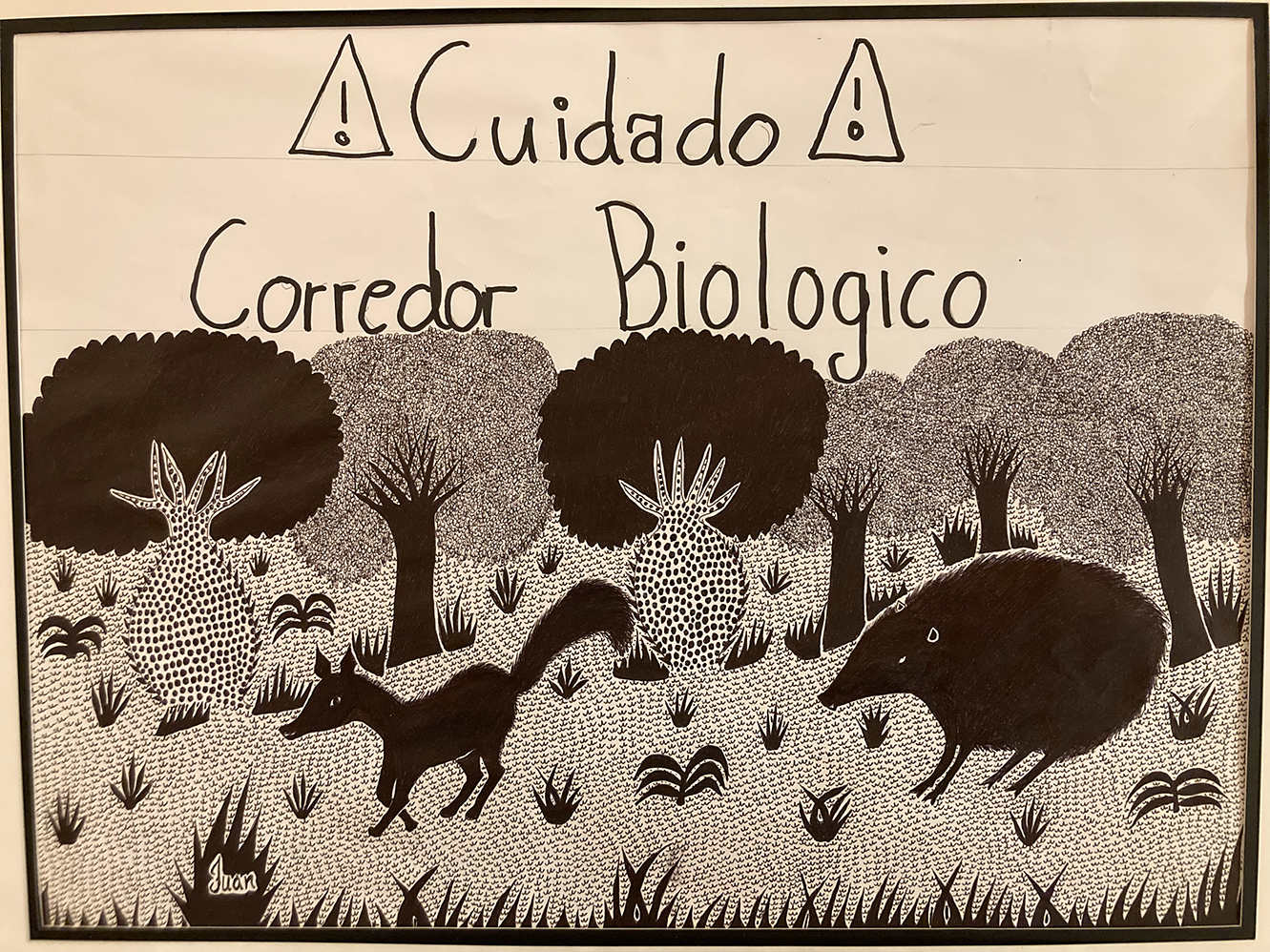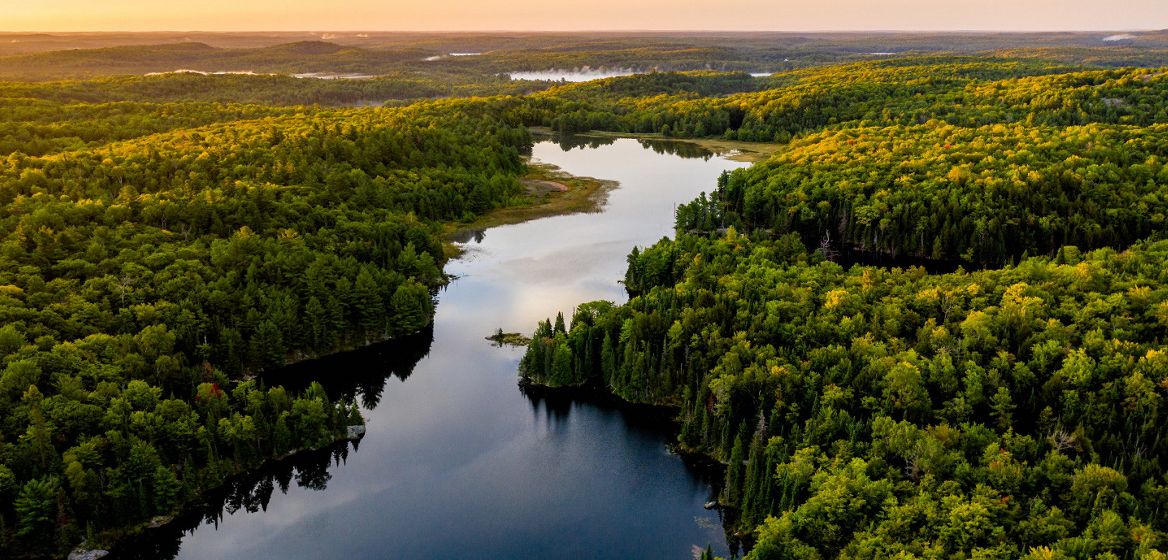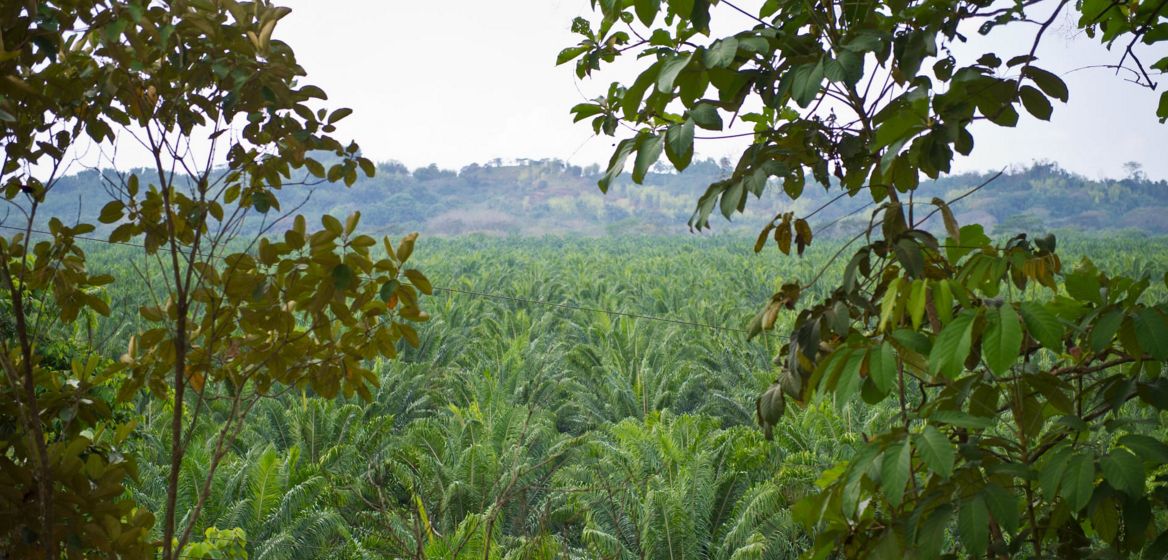Nature, Forests & Water
We take a holistic approach to helping protect natural resources, the communities that rely on them and the future of our business.
We aim to help build resilience with suppliers and farmers to help preserve natural ecosystems, enhance biodiversity and safeguard water resources needed for our business.
This work is intricately connected to our efforts across Climate Action, Responsible Sourcing and Human Rights.
On this page you'll find information about our approach to this topic and links to related topics. See our latest Purpose & Impact Report on the Goal Performance & Reporting page for more information.
Focus on Forests & Natural Ecosystems
Our Commitment
Back in 2015, following our endorsement of the New York Declaration on Forests (NYDF), we released our first Commitment on Forests. This was developed from our work to help protect forests dating back to the early 1980s, with our first related corporate policy in 1989. In 2024, we refreshed our Commitment on Forests and Natural Ecosystems (PDF – 126 KB), to better reflect the evolution of industry best practices and standards and our progress to safeguard natural ecosystems. In it, we outline our commitment to eliminate deforestation1 and address conversion2 in our global supply chain by 2030, for commodities and regions where we can deliver the greatest impact – building on our 2020 milestones to support deforestation-free supply chains for our primary commodities. See our latest Purpose & Impact Report for updates on our progress toward these goals.
The Company’s refreshed commitment extends beyond forests to actions that also help protect natural ecosystems and areas of high conservation value alongside helping safeguard the people and communities who depend on these natural spaces. Solutions to help address the conversion of natural ecosystems take different forms in each area of the world. Best practices to establish a baseline, track progress and report the impact of actions related to conversion are still being developed, as is the technology to monitor conversion. Examples of the Company’s work to help address conversion include its participation in the Land Use Change Initiative in the U.S., which aims to evaluate the drivers and impacts of land use change, work with U.S. chicken suppliers to review sourcing sheds for soy feed to overlay information to identify potential risk for ecosystem conversion, its support in Brazil of the Voluntary Monitoring Protocol for Cattle Suppliers in the Cerrado and its inclusion of conversion sourcing requirements for beef the Company purchases from priority origins in the Brazilian Cerrado.
The updated commitment also reflects the link between deforestation and emissions associated with land use change, in line with the Science Based Target initiative’s (SBTi) Forests, Land and Agriculture (FLAG) framework and our climate goal (read more on our Climate Action page).
Our Global Supply Chain Approach
We are committed to helping drive industry transformation, supporting deforestation-free supply chains and addressing conversion at scale. We believe that, in addition to having a commitment, it is important to take steps to understand the root cause of historic and potential future land use change, and to learn about the broader context for the communities in which we operate and buy from. We engage our suppliers to help ensure they understand our Commitment on Forests and Natural Ecosystems, how it applies to them and what our expectations are, as well as the technical details of our related sustainable sourcing policies. We are also engaging them on what they’re doing well and where there is room for improvement in terms of natural ecosystem protection.
Engaging Our Supply Chains
To further our efforts, we identify the areas where we can have the greatest positive impact in our supply chains:
- We collaborate globally with Proforest, World Wildlife Fund (WWF) and industry groups to help amplify impact.
- We maintain detailed sourcing requirements for all priority commodities, engaging suppliers to implement our requirements and achieve aligned goals across their own businesses.
- We analyze suppliers’ progress and adherence to our sustainable sourcing requirements and curate tailored suggestions to further align collective action on deforestation-free supply chains.
- We are collaborating with our suppliers to adhere to the European Union Deforestation Regulation (EUDR), as applicable to our priority commodities (read more about Sourcing Our Priority Commodities) as well as cocoa and rubber.
Sourcing Our Priority Commodities
Recognizing that each raw material is different and requires a tailored approach, under the McDonald’s Commitment on Forests and Natural Ecosystems we identified where McDonald’s can best use our scale for progress. Since 2015, we have prioritized the following commodities, considering their potential role as leading drivers of deforestation globally:
- Beef
- Soy (for chicken feed)
- Palm oil
- Coffee
- Fiber-based packaging (used for primary guest packaging)
Where possible, we rely on reputable, commodity-specific third-party certifications to verify compliance with our sustainable sourcing policies. When suitable certifications are not available, we invest in external verification systems to monitor and address our potential impact, alongside our suppliers.
Using the Accountability Framework to guide our work, we pursue a range of other actions, as part of our sustainable sourcing policies, to bring our commitment to life for each priority commodity:
- Beef: Alongside Proforest, we developed the Company’s Deforestation-Free Beef Procurement Policy (PDF – 214 KB). We have detailed requirements to help support forest-positive beef sourcing from high-priority origins in Brazil, Paraguay, Argentina and Australia. We work alongside our geo-monitoring service providers to utilize social and environmental criteria and monitor adherence to our policy, focusing on purchasing from producers that conserve forests and respect human rights.
- Soy (for chicken feed): In 2024 we completed a soy for chicken feed mapping project alongside McDonald’s chicken suppliers, which helped inform refinements to the McDonald’s soy for chicken feed strategy. In line with Proforest, and the Consumer Goods Forum’s Forest Positive Coalition, we reviewed the origins of soy used for feed for chickens sourced for McDonald’s restaurants, potential natural ecosystem conversion risks in these origins and current solutions available to reduce risk and strengthen ecosystem and soy producer resiliency.
- Palm oil: We require that palm oil sourced for McDonald’s restaurants or as ingredients in McDonald’s products be covered by Roundtable on Sustainable Palm Oil (RSPO) certification or credits. All countries are considered high-priority regions for palm oil and all volumes must meet this requirement. McDonald’s is committed to increasing traceability by requiring physical certification for the palm oil sourced for McDonald’s restaurants or as ingredients in McDonald’s products in the greatest volumes. Consistent with the Company’s Commitment on Forests and Natural Ecosystems, we support the work of the sector to strengthen the delivery of NDPE (no deforestation, no expansion on peat and no exploitation) in palm oil production and we have invested in a supply chain project with one of our key suppliers to cascade this work further upstream. Read more on our Responsible Sourcing page.
- Coffee: McDonald’s requires coffee sourced from Honduras, Indonesia and Vietnam to be Rainforest Alliance Certified™. Globally, we require suppliers to sustainably source their ground and whole-bean coffee, including decaffeinated coffee, coffee used in espresso-based drinks, coffee brewed at restaurants and all coffee used in retail products. Sustainably sourced means coffee is either Rainforest Alliance, Fair Trade USA or Fairtrade International certified, or is coming from a McCafé Sustainability Improvement Platform (SIP) program. Read more about how we support more sustainable coffee sourcing on our Responsible Sourcing page.
- Fiber: McDonald’s requires that our fiber-based primary guest packaging be sourced from Forest Stewardship Council® (FSC®) certified or FSC® controlled wood sources, with full chain of custody certification when the country of fiber origin includes Argentina, Cambodia, China, Indonesia, Laos, Malaysia and Vietnam.3 Outside these areas, FSC, Programme for the Endorsement of Forest Certification (PEFC) or Sustainable Forestry Institute (SFI) certification schemes are acceptable for suppliers to use.
We believe working alongside our suppliers to support adherence to the Company’s sustainable sourcing policies and requirements is critical to helping realize our Commitment on Forests and Natural Ecosystems. As such, the Company takes steps to help train and otherwise engage suppliers, including on corrective action plans, where appropriate. We also encourage our suppliers to work directly with producers around reintegration opportunities so that, together, we are helping build a more resilient and responsible supply chain that supports natural ecosystems and producer livelihoods.
Read more about our cut-off dates on deforestation by commodity/biome (PDF – 128 KB).
Human Rights & Forests
The Company’s Commitment on Forests and Natural Ecosystems includes respect for human rights, as set out in the McDonald’s Human Rights Policy (PDF – 120 KB) and informed by the Universal Declaration of Human Rights (UDHR). This is because we see respect for human rights as key to helping protect the well-being of people and the planet. As our commitment includes significant emphasis on people of all identities, including Indigenous and smallholders, we take steps to help ensure there are people-related elements in the Company’s sustainable sourcing policies.

The Paraguayan Chaco is home to 327 Indigenous communities, and one of our beef suppliers is collaborating with them. All producers in this biome are required by law to have ecological corridors running alongside their property. Our supplier worked with local Indigenous communities to sketch native wildlife living in these corridors and post these pictures as well as messages on roads nearby, to help the community support the safe movement of wildlife.
We also partner with Hendata SRL and the Federation for the Self Determination of Indigenous Peoples (FAPI) to demarcate five Indigenous communities, as supported by the Association of Indigenous Cooperation Services (ASCIM), covering 30,961 hectares of the Paraguayan Gran Chaco. This work ensures free and prior informed consent from the Indigenous communities, brought together public and private actors, and protected community land rights as recognized by the national government.
Read more about how we uphold human rights on our Human Rights page, as well as in our Purpose & Impact Report, which can be found on our Goal Performance & Reporting page.
Aligning Our Approach With Best Practices & Leading Industry Associations
We look to external organizations and frameworks to help ensure our approach aligns with relevant best practices. We are engaged with various organizations, such as:
- We are members of the Consumer Goods Forum’s Forest Positive Coalition, a multi-company initiative to address commodity-driven deforestation and conversion. Learn more in McDonald's 2024 Consumer Goods Forum’s Forest Positive Coalition Report (PDF – 187 KB). McDonald’s co-leads the Beef Working Group and actively participates in the Soy Working Group and Landscapes Working Group. Find out more about Commodity Roadmaps on the Consumer Goods Forum website.
- We advise the Accountability Framework through the AFi Private Sector Advisory Group to support sustainable transformation of agricultural value chains at scale.
- We were a founding member of the Global Roundtable for Sustainable Beef (GRSB) in 2011 and co-lead the Nature Positive Production Working Group. We also locally participate in the regional and national roundtables around the world, as linked to the GRSB. Read more about our work with the GRSB on the Responsible Sourcing page.
- We participate in the Land Use Change Initiative in the U.S. to support industry alignment on natural ecosystem conversion.
- We are collaborating throughout the industry through the Voluntary Monitoring Protocol for Cattle Suppliers in the Cerrado to support best practices in addressing the potential social and environmental impacts in cattle supply chains in the Cerrado biome of Brazil.
Definitions
To help ensure we are reporting clearly and consistently against our commitments, and in conjunction with our work with experts and recognized frameworks such as the Accountability Framework, McDonald’s commitments and expectations, as outlined above, reference the definitions set out below.
- Eliminate deforestation refers to action that McDonald’s, Franchisees and suppliers are taking to live out the McDonald's Commitment on Forests and Natural Ecosystems (PDF – 126 KB). In alignment with the Accountability Framework, deforestation refers to the loss of natural forest as a result of conversion to agriculture or other non-forest land use; conversion to a tree plantation; or severe and sustained degradation. We use the term “supporting deforestation-free supply chains” on this page to reflect the actions we are currently taking to implement, measure and report progress toward our commitment.
- Deforestation refers to the loss of natural forest as a result of i) conversion to agriculture or other non-forest land use; ii) conversion to a tree plantation; or iii) severe and sustained degradation, as aligned with the definitions of the Accountability Framework.
- High-priority origins are defined as countries, biomes, municipalities, farms or postcodes that are identified as areas where deforestation and/or attributable conversion has occurred historically as determined through regular assessments, including with third parties, that rely on the latest supply chain data and trends related to forests and natural ecosystems.
- Low-priority origins refers to countries, biomes, municipalities, farms or postcodes that are identified as areas without or with a low risk of deforestation and/or attributable conversion, as determined through regular assessments, including with third parties, that rely on the latest supply chain data and trends related to forests and natural ecosystems.
- Supporting deforestation-free supply chains refers to the work the Company is doing relative to priority commodities in its supply chains that are either sourced sustainably from high-priority regions and comply with McDonald’s sustainable sourcing requirements as set out or are sourced from low-priority regions.
- Water stress: as aligned with World Resources Institute (WRI), in this context, baseline water stress (BWS) measures the ratio of total water demand to available renewable surface and groundwater supplies.
- Conversion, as aligned with the Accountability Framework, refers to change or a loss of a natural ecosystem as a result of its replacement with agriculture or other land use, or due to a profound and sustained change in a natural ecosystem’s species composition, structure or function.
- Natural ecosystems, as defined by the Accountability Framework, refers to an ecosystem that substantially resembles – in terms of species composition, structure and ecological function – one that is or would be found in a given area in the absence of major human impacts. This includes human-managed ecosystems where much of the natural species composition, structure and ecological function are present.
Focus on Nature & Biodiversity
Natural ecosystems play a vital role in supporting biodiversity, as well as ensuring a thriving and resilient food system, and the United Nations (UN) and other bodies have stressed the importance of forests to combatting climate change.
Developing Our Approach
We use policies and supplier engagement to encourage management practices that actively support biodiversity rather than relying on biodiversity offsets.
We also take steps to assess potential nature-related dependencies and risks, identifying opportunities to adapt and innovate for positive future impact.
Advancing Regenerative Agriculture
We promote regenerative agriculture as a key tool for suppliers to help further the Company’s nature, forests and water strategies.
The positive environmental impacts and biodiversity benefits from regenerative farming models are clear and measurable, but there are also notable social benefits. By promoting regenerative agriculture, we can also support farming communities and create more economically viable systems for the long term.
See our Responsible Sourcing page for more information about how we promote regenerative agriculture principles, as well as our latest Purpose & Impact Report, which can be found on our Goal Performance & Reporting page, for key examples of our current projects.
Focus on Water
Water is vital to our business. McDonald’s restaurants need safe, readily available water to operate and to serve the drinks our customers love. Additionally, to create our iconic menu items, our suppliers rely on agricultural products that depend on finite freshwater sources.
Shaping Our Water Strategy
We’re working to conserve water, use it responsibly and efficiently, and further build resiliency within the McDonald’s System. The Company has a history of supporting water stewardship efforts, both at restaurants and within its supply chain.
We are partnering with our Franchisees and suppliers to continue to evolve our global approach to water stewardship. We want to be guided by the latest research available and therefore collaborate with experts such as the World Resources Institute (WRI) and World Wildlife Fund (WWF). Along with other brands, we also leverage the GlobeScan & WWF Future Water Agenda program and WRI's Aqueduct Alliance for strategic and technical guidance.
The Company completed a water risk assessment of its value chain in 2025, with a focus on identifying water-stress4 areas. “Value chain” for this purpose is defined to include suppliers and franchised restaurants. In addition, we reviewed Company-owned and operated restaurants. The Company collaborated with the World Resources Institute (WRI) to perform the assessment and World Wildlife Fund (WWF) to inform the assessment. The results will be used to inform the Company’s water-related resiliency strategies, consistent with our governance approach for Purpose & Impact and our Enterprise Risk Management framework as described here. See details of this risk assessment here (PDF – 341 KB).
Encouraging Supplier Action
We encourage suppliers, through self-managed excellence, to identify and manage their key water-related risks and opportunities. We’re proud to note that many of McDonald’s suppliers have made independent commitments and are recognized for leadership in water efficiency and replenishment, including Coca-Cola and Cargill. Additionally, in locations such as the Paraguayan Chaco, our beef raw material suppliers utilize water innovations such as collecting rainwater to be used as drinking water for cattle and to irrigate agricultural land.
Water Stewardship in Restaurants
We focus on water quality, availability, efficiency and stewardship for McDonald’s restaurants, and – recognizing availability and quality varies from region to region – take a localized approach to water management. McDonald's water efficiency standards specify low flow equipment for all restaurants built since 2020. In some locations, additional measures such as greywater reuse, condensation recovery, drought-tolerant landscaping and permeable pavements have been implemented. We capture learnings from projects and, where relevant, share them with other McDonald’s restaurants.
Moving Forward
The Company will continue to work in partnership with key stakeholders such as Franchisees and suppliers, as well as strategic and technical experts at WRI and WWF, to support Company resiliency as related to water stewardship.
Footnotes
1 "Eliminate deforestation” refers to action that McDonald’s, Franchisees and suppliers are taking to live out the McDonald's Commitment on Forests and Natural Ecosystems (PDF – 126 KB). In alignment with the Accountability Framework, deforestation refers to: Loss of natural forest as a result of: (i) conversion to agriculture or other non-forest land use; (ii) conversion to a tree plantation; or (iii) severe and sustained degradation.
2 As aligned with Accountability Framework Initiative, conversion refers to: change of a natural ecosystem to another land use or profound change in a natural ecosystem’s species composition, structure or function.
3 Product sourced from facilities in Russia but for sale in active markets is still included within our data sets, despite our decision to exit Russia in 2022. This includes fish from Russian fisheries or fiber from Russian forests.
4 Aligned with WRI, in this context, baseline water stress (BWS) measures the ratio of total water demand to available renewable surface and groundwater supplies.





